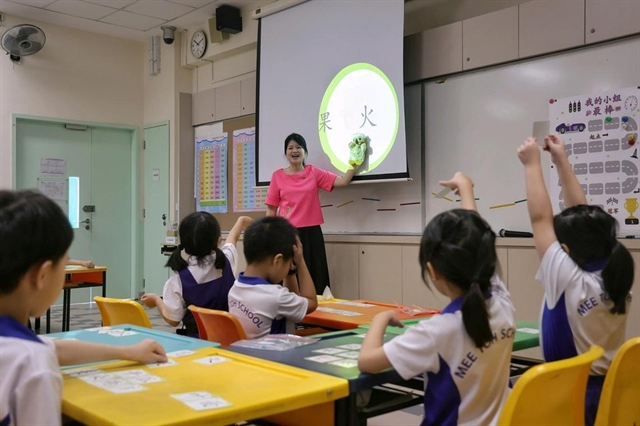 World
World


|
| Overall, the number of teachers in Singapore has fallen due to a slowdown in recruitment, dropping from 33,378 in 2016 to 30,396 in 2023. — Photo from The Straits Times |
SINGAPORE — Over the next few years, Singapore will hire more than 1,000 new educators annually to strengthen the teaching fraternity, Education Minister Desmond Lee said on July 9.
This is up from about 700 teachers recruited a year previously.
Overall, the number of teachers in Singapore has fallen due to a slowdown in recruitment, dropping from 33,378 in 2016 to 30,396 in 2023. This is due to smaller cohort sizes.
The Education Ministry has not released the figure for 2024. The ministry said in a statement on July 9 that its hiring strategy supports long-term workforce sustainability and talent acquisition.
This includes hiring in anticipation of more retirements in the coming years as the teaching workforce ages, in line with national workforce trends, it added.
Speaking at the annual Teachers’ Investiture Ceremony at the National Institute of Education (NIE) in Nanyang Technological University, Lee said: “Through the years, we have built a committed and high-quality teaching force to ensure that every child has the opportunity to realise his or her potential, regardless of starting point in life.”
The education system must do more than keep pace with rapid and fundamental changes, he said, from advancements in artificial intelligence to climate change, to social media platforms transforming the way young people communicate.
“We must also stay updated on the developments around us, and prepare our students for a fast-changing world,” he said.
On July 9, NIE marked the graduation of 721 new and returning teachers joining Singapore’s education service.
Of the cohort, 47 graduands were given awards such as the Lee Kuan Yew Gold Medal and the NIE Award. These are given to those who had performed well in their studies.
Seven teachers under the age of 35 were awarded the Outstanding Youth in Education Award for their impact in nurturing their students.
One of them was Fuhua Primary School teacher Lim Yang Jun. The 34-year-old started his teaching journey in 2015 at Grace Orchard School, which serves students with mild intellectual disabilities.
Now posted to a mainstream school, he champions inclusivity and seeks to cater to students of different needs.
He introduced “calming corners” in every classroom for students who may be experiencing negative emotions and need support.
“As a teacher, I see everyone I come across as a responsibility. I want to help them and ensure everyone has an equal chance to grow and shine,” he said.
Lee, who took over the education portfolio in May, urged teachers to instil in students a desire for learning. The capacity for sound judgment, socio-emotional competencies and having good core values are what truly matters in the real world, rather than academic excellence, he said.
He added that this is why the ministry has been gradually reducing the emphasis on academic grades and has moved towards developing diverse skills and attributes among students.
Singapore has progressively done away with mid-year examinations since 2019, and it fully implemented full subject-based banding in 2024. Full subject-based banding allows students to take subjects at different levels based on their strengths, rather than being grouped into rigid academic streams such as Express, Normal (Academic) and Normal (Technical).
“But these system-level changes must be supported by learning experiences in school that not only help our students discover their unique strengths and interests, but also ignite a deep and lasting joy of learning,” Lee said.
Educators also need to guide students to stand together in an increasingly diverse society, he added.
“With widening generational gaps, heightened sensitivities and varying aspirations and beliefs, our unity and social cohesion cannot be taken for granted. They must be nurtured intentionally, through empathy, dialogue and a commitment to our shared future,” he said.
Another challenge is helping students move from a concept of individual success to shared responsibility, he added.
“This includes creating opportunities for students of different backgrounds to learn together, teaching them to listen with empathy and regard each other with compassion, and to find unity in diversity, just as our forefathers did during our nation-building years.
“We must provide the learning environment to foster this.” — THE STRAITS TIMES/ANN




